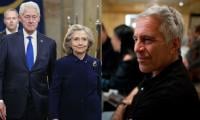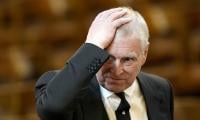Of horses and greener pastures
“At present, the horses are free to graze”. That’s how the then president Ghulam Ishaq Khan, who had earlier removed Benazir Bhutto as prime minister, played down the allegations that politicians were being forced to shift loyalties during the run-up to the 1990 national elections. In those elections, Bhutto’s PPP was swept aside by the Islami Jamhoori Ittehad (IJI), paving the way for Nawaz Sharif’s first stint as PM.
The 1990 polls were not a one-off event. As a rule, whenever parliamentary elections draw closer, the turnover of politicians bumps up depending on which way the wind is blowing. Like it or lump it, horse trading, or a change in loyalties, is an ingredient of the political culture.
Every major political party comprises three types of members. The first type entails diehard party supporters who remain committed to the party, come rain or shine. Even if they don’t see eye to eye with the leadership on some issues and have some lingering personal grievances, they will not quit the party. They either sink or swim with the party. The second category consists of politicians who have a long association with the party and haven’t left it in the lurch when the chips were down. However, they may part ways with the party either when they feel they are being passed over or when they can’t agree with the party’s position on ‘vital’ issues.
The third type consists of opportunists to the bone. They worm their way into a party when the cards are stacked in its favour – piggyback towards greener pastures that it offers – and make the leadership believe that their sincerity with the party is impeccable. The moment they feel the party is up the creek, they hesitate not one whit in abandoning it and shifting their loyalties towards another party. It is this category of politicians that is in the news before every election.
For their part, political parties have an open-door policy for the electable. Principles, ideologies and narratives aside, in an electoral battle it is constituency politics that tips the scales in favour of or against a party. Hence, a party that closes its doors on an influential politician will do so only at its own peril.
For both parties and individuals, indulging in a change of loyalties is a form of rational behaviour as the costs of remaining in a party whose fortune is seen to be going downhill – or, for that matter, refusing admission to an electable – outweigh any benefits that may be drawn from sticking to principles. It also ensures that the bulk of the scarce electoral resources are appropriated by a party that is better placed than others to win the electoral race, thus racking up its prospects.
At the same time, such acts of gerrymandering leaves the parties that face defections worse off. The resultant allegations of foul play cast a pall over the political horizon and the system’s credibility comes under question. In a reversal of fortunes, today’s beneficiary may find itself at the receiving end at the end of the next election cycle.
This is what happened during the recent Senate elections in which almost every party tried to draw upon the strength of other parties to enlarge the size of its pie. The results left all principal players – save one, for obvious reasons –howling their displeasure and frustration. The elections to the Upper House three years later may prompt a similar outcry – only the losers may be different.
In the run-up to the 2018 elections, the party for which most of the electables in Punjab – the province in which electoral fortunes are made or lost – are making a beeline is the PTI. With the PML-N fending off cases against its top leadership and the PPP in disarray – though it is desperately vying to win over the powers that be – the PTI seems to be the promised land for turncoats.
Winning an election has so far been a pot of gold for the PTI and its charismatic leader. Imran Khan’s claim to power has largely rested on his (avowedly) occupying a high moral ground. He has cast himself as being on a noble mission to root out corruption and cronyism – the twin deadly evils that, going by his narrative, have brought the country on the verge of a breakdown. He has been arguing for years on end that the leaders of both rival parties, which have taken turns in the corridors of power, are mired in corruption and bad governance and that he holds an inimitable record of public service. Hence, electing anyone else to power would only spell disaster.
Cleaning up the Augean stable of politics is not a new watchword in Pakistani politics. Many political leaders and soldiers of fortune have styled themselves as moral crusaders and either pledged or called for ‘ruthless’ accountability. But their anti-graft, anti-lewdness tirade turned out to be no more than a fig leaf for their appetite for power.
Without passing a judgement on the validity of Imran Khan’s claim of being the long-awaited saviour, it can be safely said that his ‘superior’ moral credentials, relative to those of his rivals, did not help his cause in the past. This is not in the least surprising. Far from being a struggle between good and evil, politics is a scramble for power and a show of strength.
If a political party is to capture power, it must finish first in the electoral race. In order to do so, it needs to field the candidates who have a sizeable vote bank – the electables. Elections are then a test of the political and mercenary prowess of the candidates to manipulate their outcome. The PTI fought electoral battles in 1997 and 2002 and on each occasion was routed because it didn’t have winning horses. The party was a one-man show without a single political heavyweight. Hence, in the first decade of its birth, the PTI remained a non-entity in national politics. Whether Imran Khan himself had been selective in choosing his team or the movers and shakers didn’t risk betting on him is anybody’s guess.
There can hardly be a better teacher than adverse experience. Having been in politics for long enough, Khan began to know the ropes of a successful political strategy. While he kept flirting with the moral argument, he shifted gears and began playing host to electables as early as 2011. On their part, the electables, who had earlier shunned him, joined him because they could see which way the wind was blowing. Although the PTI failed to hit the bull’s eye in the 2013 elections, it emerged as the third largest political party. Pragmatism had worked.
Over the last eight years, the PTI has welcomed many compulsive turncoats into its folds with open arms – arguably more than any other party has done. The moral argument comes in handy in this respect. As long as a politician is in the PPP or the PML-N, he is a totem of corruption and everything that goes with it. The moment they are initiated into the PTI and baptised by its self-righteous leader, their sins are washed away in one go. In a jiffy, they are metamorphosed into saints.
This is not to suggest that the politics of wooing electables is exclusive to the PTI. All other parties of note play this game with an equal fondness. The PTI is only a late user of this time-tested recipe for electoral triumph, and for the moment it seems to be its principal beneficiary.
The writer is a freelancecontributor.
Email: hussainhzaidi@gmail.com
-
 Prince Harry’s Concerns Laid Bare As Meghan Markle Eyes Global As Ever Expansion
Prince Harry’s Concerns Laid Bare As Meghan Markle Eyes Global As Ever Expansion -
 James Harden Trade Talks Heat Up As Clippers, Cavaliers Explore Deal
James Harden Trade Talks Heat Up As Clippers, Cavaliers Explore Deal -
 Trump Launches ‘Project Vault’: $12bn Critical Minerals Stockpile To Shield US Industry From China’s Dominance
Trump Launches ‘Project Vault’: $12bn Critical Minerals Stockpile To Shield US Industry From China’s Dominance -
 Epstein Probe: Bill, Hillary Clinton To Testify Ahead Of Congress Contempt Vote
Epstein Probe: Bill, Hillary Clinton To Testify Ahead Of Congress Contempt Vote -
 OpenAI Reportedly Explores Alternatives To Nvidia For AI Inference Chips
OpenAI Reportedly Explores Alternatives To Nvidia For AI Inference Chips -
 Nazem Kadri Trade Talks Cool With Canadiens After Roster Upgrades
Nazem Kadri Trade Talks Cool With Canadiens After Roster Upgrades -
 Bad Bunny Engaged? Ring On Rapper's Finger Sparks Buzz
Bad Bunny Engaged? Ring On Rapper's Finger Sparks Buzz -
 FCAC Fines BMO For Billing Errors Affecting 100,000 Customers
FCAC Fines BMO For Billing Errors Affecting 100,000 Customers -
 Weather Snow Storm Shuts Down Metro Newfoundland As Heavy Snow Hits
Weather Snow Storm Shuts Down Metro Newfoundland As Heavy Snow Hits -
 Sarah Ferguson Faces Major Setback As She Continues To Pay The Price Of Past Ties With Epstein
Sarah Ferguson Faces Major Setback As She Continues To Pay The Price Of Past Ties With Epstein -
 RCMP Investigating Fatal Stavely Alberta Crash Involving Hockey Team
RCMP Investigating Fatal Stavely Alberta Crash Involving Hockey Team -
 Quinn Hughes Could Become NHL's Highest-paid Defenseman
Quinn Hughes Could Become NHL's Highest-paid Defenseman -
 New 'shocking' Details Emerge Over Millie Mackintosh, Hugo Taylor's Split
New 'shocking' Details Emerge Over Millie Mackintosh, Hugo Taylor's Split -
 Andrew, Epstein Controversy Grows As Expert Warns Bigger Story May Emerge
Andrew, Epstein Controversy Grows As Expert Warns Bigger Story May Emerge -
 Canadiens Vs Wild: Kaprizov Wins In OT As Minnesota Beats Montreal
Canadiens Vs Wild: Kaprizov Wins In OT As Minnesota Beats Montreal -
 Southern Alberta Mustangs Mourn Players Killed On Way To Practice
Southern Alberta Mustangs Mourn Players Killed On Way To Practice



